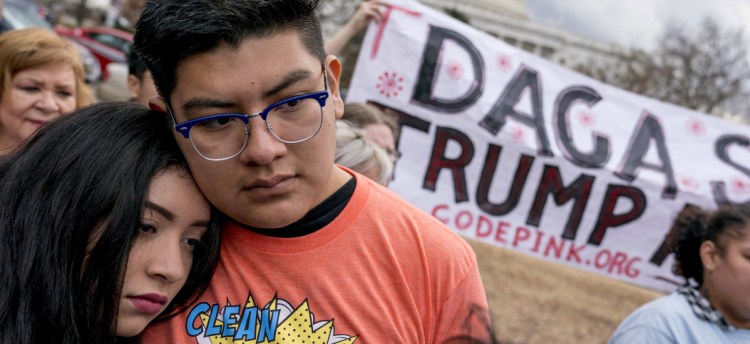The Trump administration’s lawsuit against California’s sanctuary laws is political grandstanding at its worst.
It stems from our federal leaders’ complete failure to reach desperately needed compromise on workable immigration reform.
Yes, the U.S. Immigration and Customs Enforcement raids that Attorney General Jeff Sessions so single-mindedly wants to carry out have netted some dangerous criminals.
But they’re also capturing immigrants who have built their lives here and are now being forcibly separated from their families. Immigrants who came to this country because the United States is dependent on them to provide critical labor. It’s those heartless sweeps that California sanctuary laws aim to stop while working within the confines of existing federal law. And it’s those state laws that Sessions is now trying to target. Unfortunately, the attorney general ignores the critical need to build trust between police and immigrant communities, whether their members are here legally or not.
Local and state police officers shouldn’t act as deputies of ICE. Local cops are the ones who really do keep our communities safe. If police departments in California participate in the federal crackdown on illegal immigrants, it will make police less effective and communities more dangerous.
Undocumented residents will quickly lose trust in local police. They will stop reporting crimes or criminals if they fear being deported.
No respected study has concluded that sanctuary cities and counties have more crime than non-sanctuary cities and counties. In fact, a 2017 study by University of California, San Diego, professor Tom Wong concluded just the opposite.
Wong found that sanctuary counties have significantly lower crime rates and stronger economies than those that cooperate with federal immigration enforcement efforts. Wong also said that aggressive deportation efforts separate families and leave them more economically vulnerable.
But California’s law allows local and state officials to notify ICE if they are holding an inmate who has been convicted of a serious or violent felony.
The goal of California’s new laws, Gov. Jerry Brown says, is “to be very understanding of people who have come to our state, have worked in our economy, often for decades, picking our food, working in our restaurants, working in high-tech industry. … It’s a balancing act. It does require some sensitivity.”
Sessions’ argument is anything but. The attorney general is building his case on the theory that federal law “is the supreme law of the land.”
But California officials argue they aren’t blocking ICE from enforcing immigration laws. They are only using their Tenth Amendment rights giving states the power to decide how to police their lands.
The courts rejected President Trump’s previous effort to punish sanctuary cities. U.S. District Judge William H. Orrick granted an injunction saying that the Trump administration effort to cut off federal funds to cities and counties for their sanctuary policies was unconstitutional.
The courts would do well to strike down Sessions’ effort and hand a victory to those who continue to work for the public safety of California communities.
Send questions/comments to the editors.



Comments are no longer available on this story